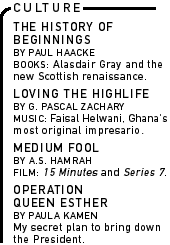

|

|

|

|
| |
|
|
|
Good soldiers get promoted, and Otto Reich, the designated assistant secretary of state for Latin America, was a good soldier--a veteran of the Reagan-Bush administration's Iran-contra scandal. Reich's nomination bodes ill, first for Latin Americans who must fear his support of the region's most extreme political forces (he is director of the Center for a Free Cuba in Washington), and second for Americans (particularly journalists) who were the object of Reich's covert attentions in the '80s. Reich served the Reagan administration from 1983 to 1986 as director of the newly created Office of Public Diplomacy for Latin America and the Caribbean. From his post in the State Department, Reich commanded a unit of PSYOPS (psychological operations) specialists who ran a covert domestic propaganda campaign to sell the American people, the media and Congress on the administration's wars against leftists in Central America. Corporate supporters of the Republicans were instrumental. A National Security Council staff member wrote in a 1983 memo: "A group of public relations specialists met with [CIA Director] Bill Casey a few days ago. ... The group included Bill Greener, the public affairs head at Phillip Morris, and two or three others. They 'stated' what needed to be done to generate a nationwide campaign. ... an effective communications system inside the government. The overall purpose would be to sell a 'new product'--Central America--by generating interest across-the-spectrum." That "inside" system was Reich's Office of Public Diplomacy, which drew up an "Action Plan" to ensure "congressional passage of aid to the Nicaraguan Freedom Fighters. ... Overall theme: The Nicaraguan Freedom Fighters are fighters for freedom in the American tradition, FSLN [Sandinistas] are evil. ... Audiences: U.S. Congress, U.S. media, interest groups." Public Diplomacy staffing was provided by the Pentagon, which assigned to Washington five members of the Army's 4th Psychological Operations Group at Fort Bragg, North Carolina. In a memo to Reich, a subordinate wrote: "Whatever you want done by your 'A-team,' just pass on to me." He went on to praise the new "troops" including a "PSYOPS type" who will "be looking for exploitable themes and trends, and will inform us of possible areas for our exploitation." Reich was a hands-on propagandist. In a memo to President Reagan, Secretary of State George Shultz praised Reich for helping "improve the quality of information the American people are receiving." As an example, Shultz mentioned a spring 1984 CBS Evening News report from El Salvador that "conveyed a deceptive image favorable to the guerrillas." Reich paid a visit to CBS and spent hours with the guilty CBS correspondent and CBS news executives. This was done, Shultz wrote, not in "an effort to embarrass anyone, but simply to try to point out flaws in the information the American people are receiving. So far everyone at CBS has been very cordial and cooperative with Ambassador Reich." Shultz added that such visits have "been repeated dozens of times over the past few months." Like when Reich visited National Public Radio, and raged about the network's coverage of CIA's covert war against the Sandinistas. According to NPR's Bill Buzenberg, Reich warned NPR news editors that he had "a special consultant service listening to all NPR programs." A 1988 report by the House Foreign Affairs Committee, concluded: "Senior CIA officials with backgrounds in covert operations, as well as military intelligence and psychological operations specialists from the Department of Defense, were deeply involved in establishing and participating in a domestic political and propaganda operation ... designed to lobby Congress, manipulate the media and influence domestic public opinion." The public never heard of any of this. In the late '80s, Reich
and company got a pass from both Congress and a cowed media. Let's
not repeat that mistake. Otto Reich's nomination is one that all
defenders of a free press should oppose.
|

